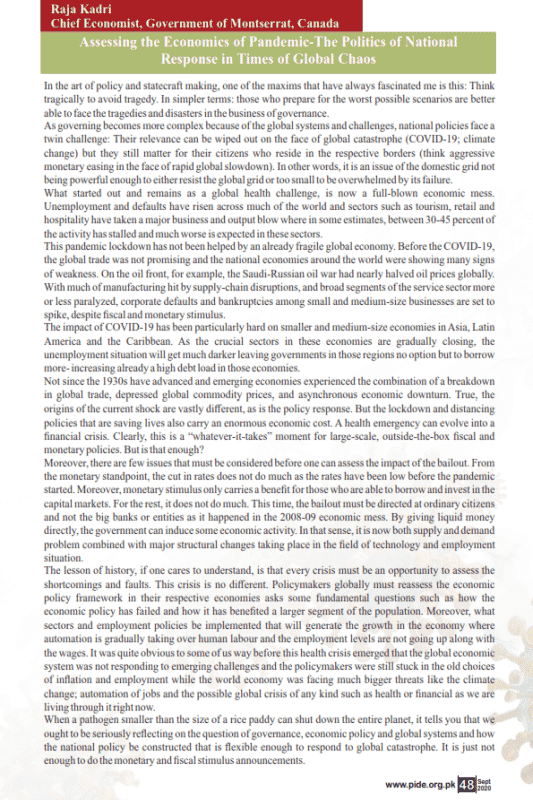
Pakistan Institute of Development Economics
- Home
Our Portals
MenuMenuMenuMenuMenuMenuMenu - ResearchMenuMenuMenuMenuMenuMenuMenu
- Discourse
- The PDR
- Our Researchers
- Academics
- Degree Verification
- Thesis Portal
- Our Portals
Assessing the Economics of Pandemic-The Politics of National Response in Times of Global Chaos (P & R Vol.1 Issue 1)
In the art of policy and statecraft making, one of the maxims that have always fascinated me is this: Think tragically to avoid tragedy. In simpler terms: those who prepare for the worst possible scenarios are better able to face the tragedies and disasters in the business of governance.
As governing becomes more complex because of the global systems and challenges, national policies face a twin challenge: Their relevance can be wiped out on the face of global catastrophe (COVID-19; climate change) but they still matter for their citizens who reside in the respective borders (think aggressive monetary easing in the face of rapid global slowdown). In other words, it is an issue of the domestic grid not being powerful enough to either resist the global grid or too small to be overwhelmed by its failure. What started out and remains as a global health challenge, is now a full-blown economic mess. Unemployment and defaults have risen across much of the world and sectors such as tourism, retail and hospitality have taken a major business and output blow where in some estimates, between 30-45 percent of the activity has stalled and much worse is expected in these sectors.
This pandemic lockdown has not been helped by an already fragile global economy. Before the COVID-19, the global trade was not promising and the national economies around the world were showing many signs of weakness. On the oil front, for example, the Saudi-Russian oil war had nearly halved oil prices globally. With much of manufacturing hit by supply-chain disruptions, and broad segments of the service sector more or less paralyzed, corporate defaults and bankruptcies among small and medium-size businesses are set to spike, despite fiscal and monetary stimulus. The impact of COVID-19 has been particularly hard on smaller and medium-size economies in Asia, Latin America and the Caribbean. As the crucial sectors in these economies are gradually closing, the unemployment situation will get much darker leaving governments in those regions no option but to borrow more- increasing already a high debt load in those economies.
Not since the 1930s have advanced and emerging economies experienced the combination of a breakdown in global trade, depressed global commodity prices, and asynchronous economic downturn. True, the origins of the current shock are vastly different, as is the policy response. But the lockdown and distancing policies that are saving lives also carry an enormous economic cost. A health emergency can evolve into a financial crisis. Clearly, this is a “whatever-it-takes” moment for large-scale, outside-the-box fiscal and monetary policies. But is that enough? Moreover, there are few issues that must be considered before one can assess the impact of the bailout. From the monetary standpoint, the cut in rates does not do much as the rates have been low before the pandemic started. Moreover, monetary stimulus only carries a benefit for those who are able to borrow and invest in the capital markets. For the rest, it does not do much. This time, the bailout must be directed at ordinary citizens and not the big banks or entities as it happened in the 2008-09 economic mess.
By giving liquid money directly, the government can induce some economic activity. In that sense, it is now both supply and demand problem combined with major structural changes taking place in the field of technology and employment situation. The lesson of history, if one cares to understand, is that every crisis must be an opportunity to assess the shortcomings and faults. This crisis is no different. Policymakers globally must reassess the economic policy framework in their respective economies asks some fundamental questions such as how the economic policy has failed and how it has benefited a larger segment of the population. Moreover, what sectors and employment policies be implemented that will generate the growth in the economy where automation is gradually taking over human labour and the employment levels are not going up along with the wages.
It was quite obvious to some of us way before this health crisis emerged that the global economic system was not responding to emerging challenges and the policymakers were still stuck in the old choices of inflation and employment while the world economy was facing much bigger threats like the climate change; automation of jobs and the possible global crisis of any kind such as health or financial as we are living through it right now. When a pathogen smaller than the size of a rice paddy can shut down the entire planet, it tells you that we ought to be seriously reflecting on the question of governance, economic policy and global systems and how the national policy be constructed that is flexible enough to respond to global catastrophe. It is just not enough to do the monetary and fiscal stimulus announcements.



